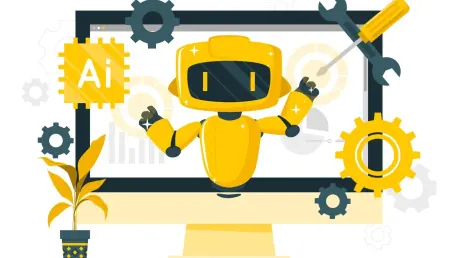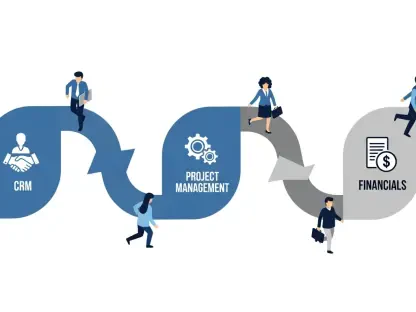The tech landscape is undergoing a seismic shift, driven by the twin forces of artificial intelligence (AI) and low-code development platforms. These innovations are not just fancy trends but are fundamentally reshaping how companies approach software development and operational strategies. In a notable instance, fintech company Klarna recently made headlines by ditching traditional SaaS tools in favor of developing in-house solutions powered by AI. This strategic pivot was driven by the need for tools that are more aligned with their specific operational requirements and a centralized data architecture compatible with AI. Such moves underscore a broader shift in the “make or buy” decision-making paradigm, redefining traditional roles and decision frameworks.
Game-Changing Role of Generative AI
Generative AI is proving to be a powerful catalyst for transformation, substantially boosting productivity and efficiency in development processes. Startups like Cursor.ia have reported up to 50% gains in code development productivity, demonstrating the tangible benefits of integrating AI into their development workflows. This type of AI is not limited to automating content creation but is now increasingly acting as a co-pilot in complex development processes. It can write code, identify bugs, and even suggest optimizations, effectively reducing the cognitive load on human developers and allowing them to focus on solving higher-order problems.
However, as powerful as generative AI is, it does not come without its own set of challenges. The technology requires substantial amounts of data to train effectively, which brings up issues related to data privacy and security. Additionally, as AI models become more complex, they can sometimes produce unexpected or biased results. Therefore, it is crucial for companies to monitor and fine-tune these AI systems continually. Despite these challenges, the productivity gains and operational efficiencies brought about by generative AI make it a valuable asset for companies that can navigate its complexities.
Revolutionary Impact of Low-Code Platforms
Low-code platforms like Retool, Flutterflow, Webflow, and Framer offer an equally transformative advantage, enabling the creation of complex applications with minimal manual coding. These platforms provide an integrated development environment that dramatically simplifies the development cycle. By reducing the need for highly specialized coding skills, low-code platforms lower the barrier to entry, allowing more team members to participate in the development process. This democratization of development empowers project managers, business analysts, and other non-developers to contribute to the creation of digital products, thereby accelerating innovation cycles and reducing time-to-market.
Moreover, low-code platforms contribute to a more collaborative atmosphere within development teams. The visual and intuitive interfaces of these platforms facilitate easier communication between developers, project managers, and other stakeholders. As a result, the lines between these roles are increasingly blurred, leading to the emergence of versatile creators who possess full-stack capabilities. This evolution is particularly significant as it brings to life the core principles of agile methodologies—shortened development cycles, iterative progress, and enhanced collaboration. These platforms allow for easy iterations and rapid adjustments, ensuring that projects can adapt to changing requirements and market conditions quickly.
Challenges and Strategic Decisions
Despite the enormous potential of AI and low-code platforms, their adoption is not without challenges. One major hurdle is the strategic decision-making regarding tool selection and project methodologies. Companies must carefully evaluate their needs and decide whether to pursue AI-assisted tailored development or to integrate comprehensive low-code platforms. This decision is complicated by the potential technological dependencies that either path may introduce, which could limit future flexibility and adaptability. Companies must weigh the short-term gains in productivity and efficiency against the long-term risks of being locked into specific technologies or platforms.
Another critical consideration is the adaptation of traditional project methodologies. As these new tools make extensive specification phases less relevant, organizations must adopt new governance approaches suited to smaller, more agile teams. This shift demands robust change management processes to ensure that all team members are aligned and capable of leveraging the new tools effectively. Training, constant communication, and iterative feedback loops become crucial components of a successful transition. The ability to adapt governance and operational models will differentiate the companies that can turn these technological advances into sustainable competitive advantages.
Future Considerations
The tech landscape is experiencing a major transformation guided by artificial intelligence (AI) and low-code development platforms. These technologies are not just the latest buzzwords; they are fundamentally changing how companies handle software development and operational strategies. A notable example is fintech firm Klarna, which recently made news for replacing traditional SaaS tools with in-house, AI-powered solutions. This decision was based on the need for tools tailored to their unique operational requirements and a centralized data framework that AI can leverage. This strategic move highlights a broader shift in the “make or buy” decision-making process, challenging traditional roles and frameworks. As more companies seek tools that better align with their specific needs and leverage AI for competitive advantage, the landscape of software development is being dramatically reshaped. These trends indicate a fundamental reevaluation of how businesses approach their tech strategies, emphasizing customization, efficiency, and innovation.









